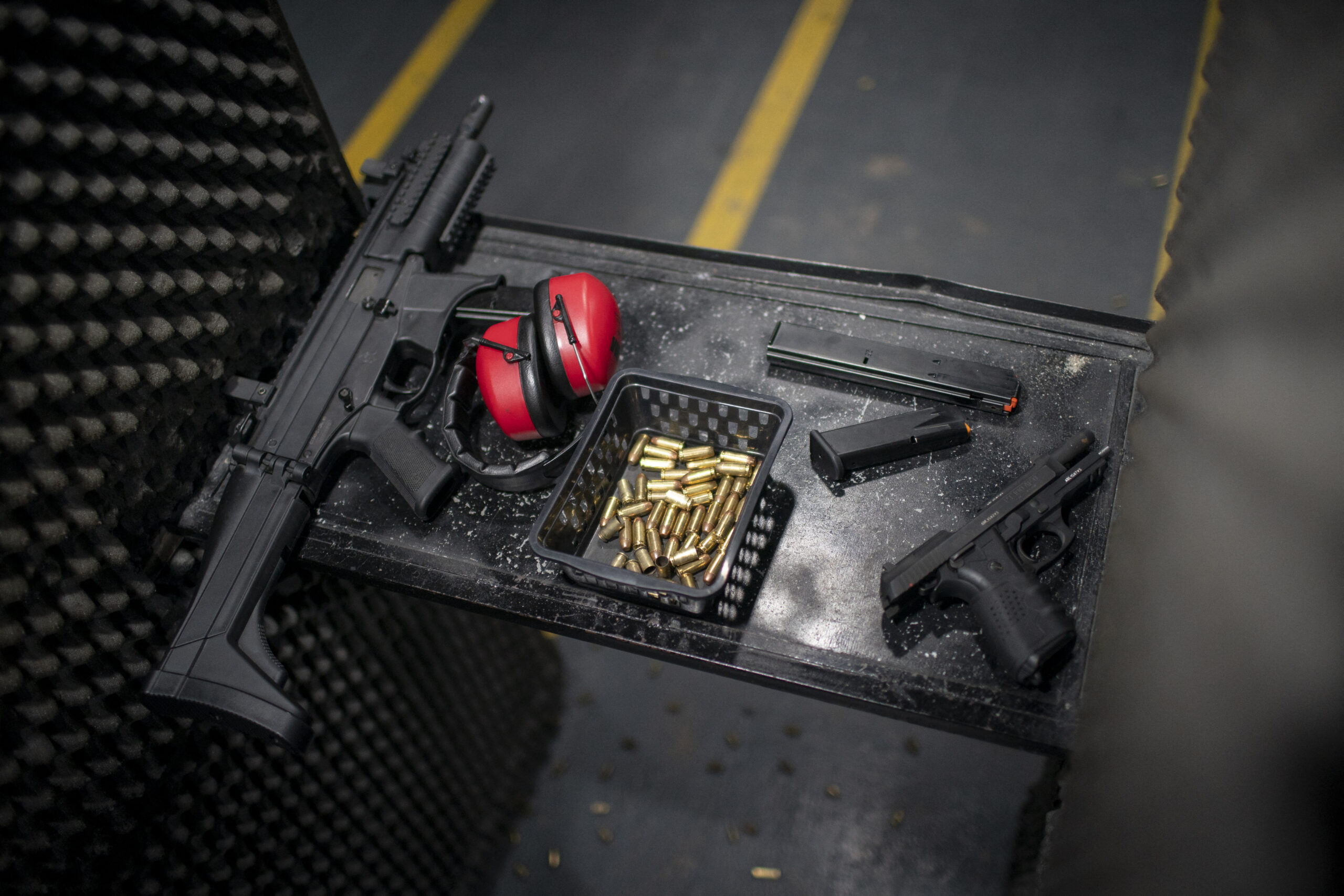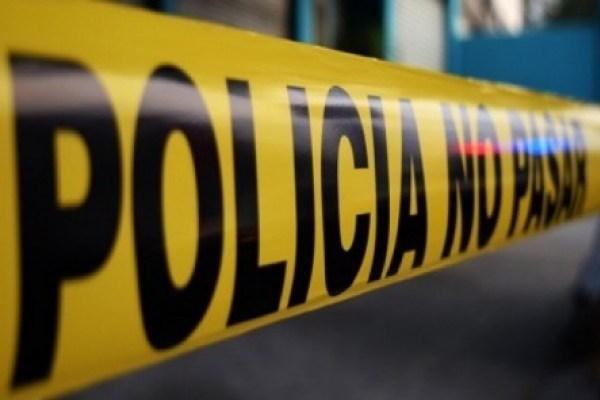International
Booming gun ownership triggers fears for Brazil vote

AFP | by Eugenia LOGIURATTO
Wearing a black T-shirt stamped with the word “Bolsonaro” and a skull, Brazilian ex-cop Elitusalem Gomes Freitas takes aim with his .40-caliber rifle and fires, savoring the smell of gunpowder as he nails his target.
Clutching his bulky black rifle at a firing range in the Rio de Janeiro suburbs, a handgun strapped to his thigh, Freitas proudly repeats one of far-right President Jair Bolsonaro’s maxims: “An armed populace will never be enslaved.”
Freitas is part of a demographic that has boomed in Bolsonaro’s Brazil: since the former army captain became president in 2019, the number of registered gun owners has more than quintupled, from 117,000 to 673,000, as the administration has loosened gun-control laws.
There are now more civilian gun owners in Brazil than police — 406,384.
That is making some Brazilians nervous as the country heads for a divisive presidential election on October 2 pitting Bolsonaro against his leftist nemesis, ex-president Luiz Inacio Lula da Silva (2003-2010), who leads in the polls.
Citing fears of election violence, the Supreme Court temporarily suspended several of Bolsonaro’s gun-control rollbacks last week. The week before, the Superior Electoral Tribunal (TSE) banned voters from bringing guns to polling stations.
Like Bolsonaro, Freitas is no fan of the electoral authority, which the president accuses of allowing what he insists — without evidence — is rampant fraud in Brazil’s electronic voting system.
After inspecting the white silhouette target he has just filled with holes, Freitas, 42, explains he is ready to take up arms if necessary to defend Brazil’s “freedom.”
“I can’t allow half a dozen people (the TSE’s judges) to decide our nation’s destiny against the people’s will. The right to bear arms is how we guarantee our freedom and defend our sovereignty against the internal enemy,” he says.
But he adds there is nothing to fear from Brazil’s burgeoning class of firearm owners.
“It’s not about arming everyone. It’s about giving good citizens the right to access a firearm and learn to use it.”
‘Cursed inheritance’
Security expert Bruno Langeani says hardliners ready to take up arms in the name of politics are a minority in Brazil.
But he emphasizes that “even a minority can cause huge damage if it’s radicalized,” pointing to the rioters who stormed the US Capitol last year after the election loss of ex-president Donald Trump — Bolsonaro’s political role model.
Langeani says the massive expansion of gun ownership in Brazil will be a “cursed inheritance” that could fuel violence for years to come.
“A civilian can now buy more powerful guns than the police,” he says.
“Licensed hunters, sport shooters and collectors can in some cases own up to 60 firearms per person, including 30 assault rifles.”
There are 4.4 million firearms in civilian hands in Brazil, a country of 212 million people, according to the Brazilian Public Security Forum.
One-third of them have expired permits.
Bolsonaro points to a fall in murders as evidence his gun policies are a success: last year, the number of homicides fell by 13 percent.
However, the number of murders with firearms increased by 24 percent, according to health ministry figures.
‘Like a shopping mall’
Around 1,000 shooting clubs — members-only firing ranges — have opened in Brazil since Bolsonaro took office, according to army figures cited by online news site UOL.
“When the government made it easier to purchase firearms, I said, ‘We have to jump on this,’” says former policeman Marcelo Costa, president of the club where Freitas practices, Mil Armas (One Thousand Firearms), which opened four years ago.
Costa operates the club with his two sons, both in their twenties and both fellow gun enthusiasts. His wife, a psychologist, is licensed by the authorities to perform the mandatory psychological evaluations of all new members.
The club, which has strict security protocols, offers lessons for members, and legal advice for those who want to obtain a gun license.
Members can borrow or purchase weapons from the club’s vast arsenal, with prices ranging from 5,000 to 20,000 reais ($950-$3,800).
“It’s like a shopping mall. We have everything,” says Costa, who offers the option to buy guns in up to 12 installments with no interest.
International
Football Fan Killed in Clashes After Colombian League Match

Fans of Cúcuta Deportivo and their traditional rivals Atlético Bucaramanga clashed outside the stadium following their local league match on Tuesday, leaving one supporter dead and several others injured.
The deceased fan was stabbed, according to a senior police official in Cúcuta who confirmed the cause of death in a video statement. Local media reported that the victim was a supporter of the visiting team, Atlético Bucaramanga.
The match ended in a 2-2 draw. Authorities had banned the entry of Atlético Bucaramanga’s organized supporters into the stadium in an effort to prevent disturbances.
Despite the restrictions, violence broke out in the surrounding areas after the game. Among the injured were three police officers, an institutional source told AFP.
The incident adds to a series of recent violent episodes linked to Colombian football. The most recent occurred in December, when supporters of Atlético Nacional and Independiente Medellín clashed in the stands and on the pitch, leaving 59 people injured.
International
Missing Spanish Sailor Rescued After 11 Days Adrift in Mediterranean

The man had departed from the port of Gandía, on Spain’s eastern coast, with the intention of reaching the southern Spanish town of Guardamar del Segura, a journey of about 150 kilometers, a spokesperson for Spain’s maritime rescue service told AFP.
Search boats and aircraft were deployed on January 17, but the operation was called off on January 22 after efforts proved unsuccessful. Alerts were then issued to vessels navigating the area in case they spotted any signs of the missing sailor.
As hopes were fading, a surveillance aircraft from the European Union’s border agency Frontex spotted the sailboat on Tuesday, along with a person signaling for help, approximately 53 nautical miles northeast of Bejaia, Algeria.
A nearby vessel, the Singapore-flagged bulk carrier Thor Confidence, carried out the rescue and is expected to bring the man to an end to his ordeal when it arrives on Thursday in the southern Spanish port city of Algeciras.
Maritime rescue services shared images on social media showing a small white sailboat drifting at sea and secured alongside the much larger ship.
It remains unclear how the sailboat ended up hundreds of kilometers off its intended route or how the man managed to survive for so long alone in open waters.
International
Rubio Says U.S. Could Participate in Follow-Up Russia-Ukraine Talks

The United States could join a new round of talks this week aimed at ending Russia’s invasion of Ukraine, Secretary of State Marco Rubio said on Tuesday.
Teams from Kyiv and Moscow met last Friday and Saturday in Abu Dhabi in their first publicly acknowledged direct negotiations to discuss the peace initiative promoted by former U.S. President Donald Trump.
“They are going to hold follow-up talks again this week,” Rubio told the Senate Foreign Relations Committee. “There could be U.S. participation.”
However, Rubio suggested that Washington’s role may be more limited than during last week’s discussions, which included Steve Witkoff, the president’s special envoy, and Jared Kushner, Trump’s son-in-law.
The secretary of state indicated that progress may have already been made on security guarantees for Ukraine, one of Kyiv’s key demands in any agreement with Moscow after nearly four years of Russian invasion.
“There is one remaining issue that everyone is familiar with, and that is the territorial claim over Donetsk,” Rubio said, referring to the eastern Ukrainian region that Russia wants Ukraine to cede.
“I know that active efforts are underway to see whether the positions of both sides on this issue can be reconciled. It remains a bridge we have not yet crossed,” he added during the hearing.
Rubio acknowledged that the territorial question would be particularly difficult for Ukraine to resolve.
-

 Central America3 days ago
Central America3 days agoGuatemala seizes over a ton of cocaine hidden in flour at Pacific port
-

 International4 days ago
International4 days agoDelcy Rodríguez seeks political agreements after Maduro’s ouster
-

 International3 days ago
International3 days agoHistoric snowstorm paralyzes Toronto after 60 centimeters of snow
-

 International3 days ago
International3 days agoSpain’s irregular migrant population rises to 840,000, study finds
-

 Central America2 days ago
Central America2 days agoGuatemala Police Arrest Prison Guard Caught in the Act of Extortion
-

 International4 days ago
International4 days agoFederal immigration agents kill man in Minneapolis, sparking protests and outrage
-

 Central America2 days ago
Central America2 days agoHonduras swears in conservative president Asfura after disputed election
-

 International22 hours ago
International22 hours agoFootball Fan Killed in Clashes After Colombian League Match
-

 Central America2 days ago
Central America2 days agoBukele leads public trust rankings as UCA survey highlights gains in security
-

 International2 days ago
International2 days agoWinter Storm Fern Leaves 30 Dead and Over One Million Without Power Across the U.S.
-

 International2 days ago
International2 days agoDoomsday clock moves to 85 seconds before midnight amid rising global risks
-

 Sin categoría2 days ago
Sin categoría2 days agoEight Killed in Series of Armed Attacks in Ecuador’s Manabí Province
-

 International3 days ago
International3 days agoRights group says nearly 6,000 killed in Iran protest crackdown
-

 International22 hours ago
International22 hours agoRubio Says U.S. Could Participate in Follow-Up Russia-Ukraine Talks
-

 International22 hours ago
International22 hours agoMissing Spanish Sailor Rescued After 11 Days Adrift in Mediterranean
-

 International2 days ago
International2 days agoSpain approves plan to regularize up to 500,000 migrants in Historic Shift
-

 Central America22 hours ago
Central America22 hours agoGuatemala President Says Starlink Terminal Found Inside Prison
-

 International3 days ago
International3 days agoVenezuela frees at least 80 political prisoners, NGO says
-

 Sin categoría2 days ago
Sin categoría2 days agoEl Salvador Launches Fourth Year of Ocean Mission to Protect Marine Ecosystems
-

 International3 days ago
International3 days agoEU launches new probe into X over AI-generated fake nude images
-

 International3 days ago
International3 days agoSevere winter storm grips U.S., leaves multiple dead as extreme cold persists
-

 International3 days ago
International3 days agoFrance debates ban on social media for children under 15


























